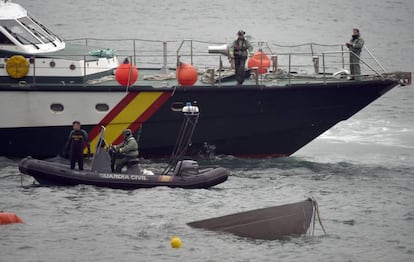Is the Spanish coast littered with single-use ‘narco-submarines’?
After the first drug-laden submersible ever caught in European waters was seized on Sunday, police are wondering whether there are more such vessels at the bottom of the sea


More than a decade ago, inside sources started telling Spanish narcotics officers about submarines that were allegedly smuggling drugs off the Galician coast, in northwestern Spain. “They mark coordinates at sea and then move the goods (and the crew) to another vessel, usually a speedboat or fishing boat, which will unload the shipment on land. Then they sink the submarine and abandon it,” said a police source, relaying the stories told by their informants.
After authorities on Sunday intercepted the first loaded “narco-submarine” ever caught in European waters, which was carrying more than 3,000 kilograms of high-quality cocaine, the police have started to think that “there must be more of these sunken vessels” off the Galician coast.
They are single-use submarines that cost €1.5 million Police investigators
According to investigators, these ships are made for this purpose by groups based in the jungles of Suriname and Guyana in South America. “They are about 22 meters long and only need two or three crew members, who are given a quick course before undertaking the mission” of crossing almost 8,000 kilometers under Atlantic waters, according to the same sources. “They are single-use submarines that cost €1.5 million.”
Last Sunday, after information was received from the US Drug Enforcement Administration, members of the Spanish National Police, the Civil Guard and the Coast Guard were ready and waiting at Hío beach in Cangas do Morrazo, in Pontevedra province. They were expecting to witness the transfer of the 3,000 kilograms of cocaine from a submarine and capture the drug smugglers. But bad weather, a possible breakdown, or potentially even a tip-off led the submarine crew to disembark hastily in that area of the coast.
“They wanted to swim away,” explained one officer. Two crew members were arrested, both from Ecuador. The third one is still on the run but investigators are confident they will find him. There is no trace of the intended recipients of the shipment, but investigators are now monitoring boats in the area.

On Monday, work continued to try to re-float the submersible, using a crane and teams of specialized divers from the Civil Guard. Investigators from the National Police now want to identify the organization behind this shipment. The first suspicions point to “the strong drug-trafficking groups that still operate in Galicia,” according to police officials.
Investigators believe that the submarine discovered on Sunday was able to make “at least two trips a year.” They have also not ruled out that the strings of the operation could have been pulled from inside a Spanish prison. Sources close to the investigation point out that “in prison circles” word had spread over a month ago that a known Galician drug lord could be preparing a shipment of 3,000 kilos of cocaine. That is the amount assumed to be inside the sunken vessel off Hío beach.
Investigators also recall that, since 2006, there have been references to these types of vessels in tapped conversations. And if there’s one thing Spanish narcotics officers are sure about, it’s that “this business never ceased in Galicia, where many shipments headed to Europe have been coordinated, because it’s where contacts were made with the Colombian cartels early on, and those ties have been strengthened and are still alive today,” said an investigator.
But the ostentation once displayed by the drug lords in this region, along with the showy speedboat chases and police raids, have since been replaced with caution, muted operations – and sunken submarines.
No connections, no evidence
All hope of proving the existence of these vessels was pinned on a protected witness, José Luis Fernández Tubío, who was called to testify at a 2014 trial of Óscar Manuel Rial Iglesias, aka "El Pastelero," or "The Baker;" and José Constante Piñeiro Búa, aka "Costiñas."
Tubío, a sailor by trade, said he was a speedboat crew member for the organization under investigation and that he acted as an intermediary with the cocaine suppliers. He had been a protected witness for years and was willing to testify before the High Court. "In his statement to the police, he spoke of a submarine that smuggled cocaine," the investigators recall.
But Tubío went missing the day before the hearing, turning what had promised to be a great blow against the drug trafficking group into a huge fiasco. Of a total of 25 defendants, only three were convicted.
Since then, narcotics officers in Galicia have tried, unsuccessfully, to find connections and evidence between the people accused in that trial and subsequent drug shipments intercepted from Latin America.
English version by Alicia Kember.
Tu suscripción se está usando en otro dispositivo
¿Quieres añadir otro usuario a tu suscripción?
Si continúas leyendo en este dispositivo, no se podrá leer en el otro.
FlechaTu suscripción se está usando en otro dispositivo y solo puedes acceder a EL PAÍS desde un dispositivo a la vez.
Si quieres compartir tu cuenta, cambia tu suscripción a la modalidad Premium, así podrás añadir otro usuario. Cada uno accederá con su propia cuenta de email, lo que os permitirá personalizar vuestra experiencia en EL PAÍS.
¿Tienes una suscripción de empresa? Accede aquí para contratar más cuentas.
En el caso de no saber quién está usando tu cuenta, te recomendamos cambiar tu contraseña aquí.
Si decides continuar compartiendo tu cuenta, este mensaje se mostrará en tu dispositivo y en el de la otra persona que está usando tu cuenta de forma indefinida, afectando a tu experiencia de lectura. Puedes consultar aquí los términos y condiciones de la suscripción digital.








































